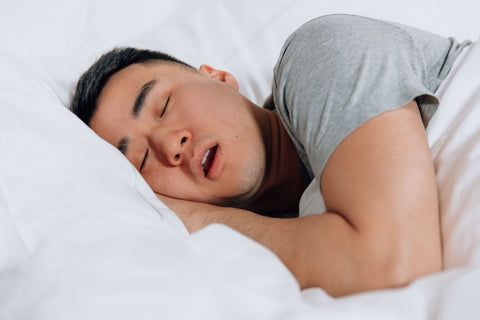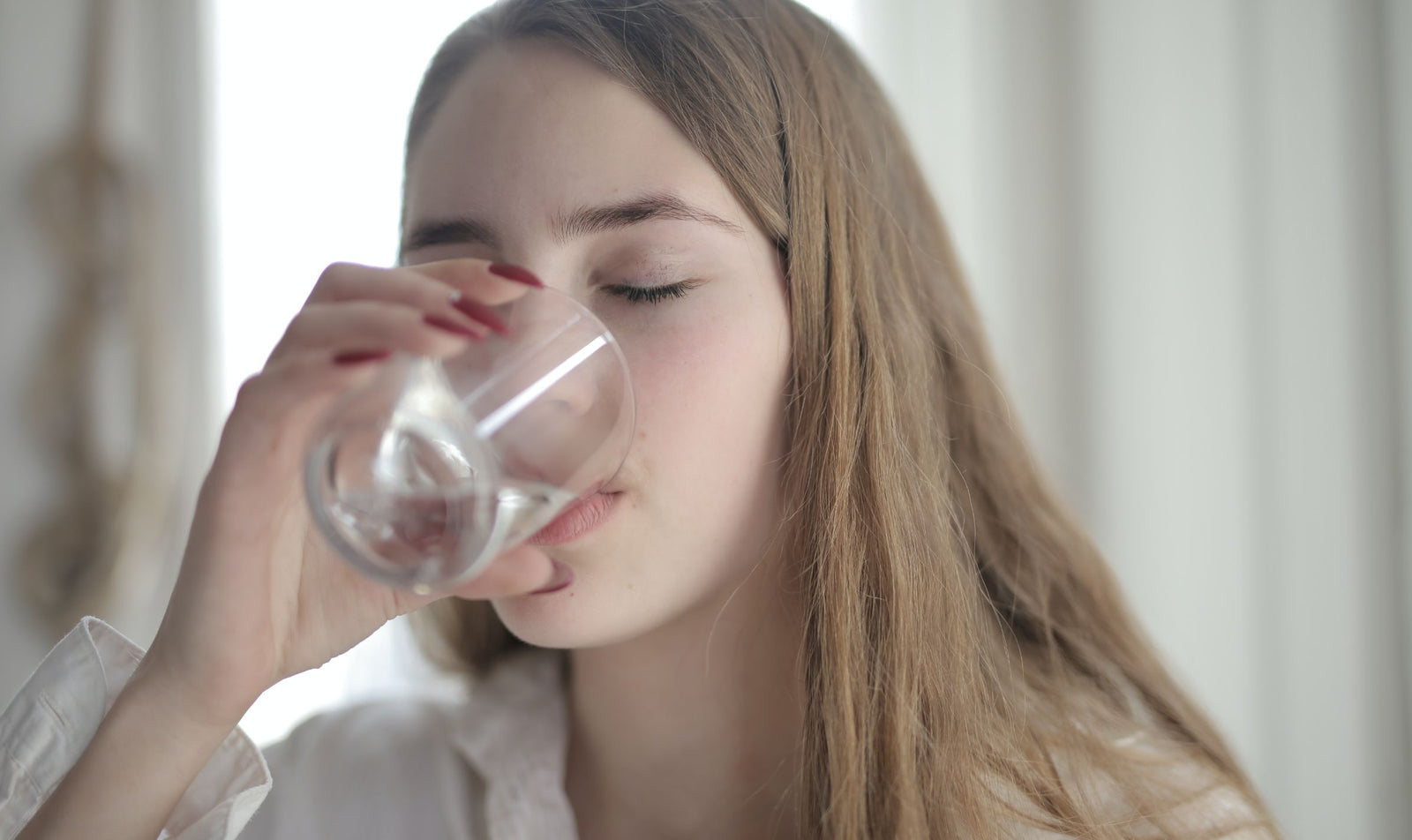Picture this: you jolt awake, your alarm is blaring, you still feel tired, and you’re desperate for a sip of coffee or water. Waking up with a dry mouth is no fun.
The good news is that you don’t have to feel groggy and fatigued every morning. Understanding what causes dry mouth while sleeping is key to preventing it.
However, it’s vital to first understand why waking up thirsty is something you should be worried about, aside from the discomfort.
Don’t Ignore Morning Thirst
Around 25 percent of adults suffer from dry mouth. As we age to 55 and older, this number rises to 40 percent. Just because dry mouth is common doesn’t mean it’s normal.
A dry mouth in the morning usually means that your saliva has evaporated during the night.

When your salivary glands aren’t functioning as they should, you feel the sensation of thirst rise. The mouth may become sticky or like it’s full of cotton balls, hence the term “cotton mouth.”
Cracked lips, a sore throat, bad breath, increased risk of cavities, and trouble talking follow.
Your body needs saliva to prevent the teeth and mouth.
Decreased saliva production is associated with tooth decay and gum disorders. Furthermore, saliva plays a huge role in regulating the pH of the mouth and also aids in digestion.

Thirst in the morning may lead to more trips to the dentist, digestion challenges, and more. So what causes dry mouth while sleeping? How can you fix it and wake up feeling comfortable and well-rested?
A major contributor to extreme thirst in the morning is a lack of hydration.
Reduce Loss of Fluids and Electrolytes
If you’re not drinking enough fluids, you may feel thirst due to dehydration. Ensure that your fluid intake is where it should be during the day.
Not all hydration has to come from drinking water. Try increasing your consumption of water-rich foods such as:
- Watermelon
- Cucumber
- Oranges
- Cantaloupe
- Tomato
- Celery
- Lettuce
- Soups
If you consume alcohol or caffeine, you may need to hydrate more than the average person. Alcohol and caffeine are diuretics, meaning they have a dehydrating effect on the body.
Drink one glass of water for every serving of alcohol or caffeine.

The environment of the room you sleep in may also increase dehydration. Sleeping in a room warmer than 67 degrees Fahrenheit may cause night sweats and morning dehydration.
Your body creates sweat to keep you cool. However, that sweat contains fluid and electrolytes that will need to be replaced by consuming more water. By keeping the room and your body cool, you’ll avoid these dehydrating night sweats and sleep more comfortably.
Aside from dehydration, hormonal imbalances may play a role in waking up with extreme thirst.
Address Hormonal Imbalances
While dissecting what causes dry mouth while sleeping, you’ve probably never considered that your hormones may be to blame.
Both estrogen and progesterone play a role in fluid regulation. Hormonal changes may increase thirst and loss of fluids at an accelerated rate.
A 2013 study demonstrated that menopausal women perceive themselves as thirstier than premenopausal women both before and after exercising.
The adrenal glands and hormone levels are also affected by stress. When you’re stressed, the adrenals pump out stress hormones like cortisol. When you are chronically stressed, the adrenal glands become exhausted.

Usually, the adrenals produce a hormone called aldosterone, which is responsible for regulating your electrolyte balance. As the adrenals become fatigued, your aldosterone levels dip, causing fluid loss, low electrolyte levels, and, of course, thirst.
Reducing stressors, increasing fluid intake, and addressing any hormonal imbalances will help keep your body in balance.
Even if your hormones are in check, the issue may all point back to your breath. Here’s how.
Stop Mouth Breathing
The way you breathe matters. We often take time for mindful moments to check in with our breath while doing yoga or taking mindful moments to meditate.
However, mouth breathing is a dysfunctional breathing method. It dries out our saliva, causes jaw misalignment, snoring, and nasal congestion.

Moreover, mouth breathing doesn’t offer the same benefits as nasal breathing. The nose features tons of tiny hairs called cilia that act as a filter, keeping dirt, debris, germs, and allergens out of our lungs.
Our noses also produce nitric oxide, a molecule known to help the body remain balanced and relaxed through parasympathetic activation.
By training yourself to hold a proper tongue posture, nasal breathing becomes more likely. This consists of the tongue placed against the roof of the mouth, just behind the teeth.
The lips should remain sealed, making mouth breathing virtually impossible. To practice this posture in action, try saying the word “sing” and hold the tongue in the same position as it rests as you end the word.
@somnifix Your 👅 is likely resting in your mouth in the wrong position. Try the #singtechnique for proper #tongueposture 😛 #airwayhealth #mouthbreathing #breathwork #learnontiktok #didyouknow via Matt Phelps on #youtube ♬ Zou Bisou Bisou - Gillian Hills
Mouth breathing during the day is bad enough, but mouth breathing at night is associated with fragmented sleep, fatigue, snoring, and may even cause obstructive sleep apnea that requires treatment with a Continuous Positive Airway Pressure (CPAP) machine.
Rule Out a Sleep Disorder
If you’re breathing through your mouth at night, your chances of developing a sleep disorder such as sleep apnea are much higher than a non-mouth breather’s.
Furthermore, if you need a CPAP machine to treat your sleep apnea, it may further dry out your mouth, worsening the problem.

Although a sleep study is needed to determine a diagnosis, signs of sleep apnea may include:
- Pauses in breathing during sleep (officially known as apneas)
- Snoring
- Weight gain
- Irritability
- Insomnia
- Headache
If left untreated, sleep apnea is associated with serious medical conditions such as hypertension, stroke, enlarged heart tissue, heart failure, diabetes, and even heart attacks.
Therefore, CPAP treatment is a necessity. Many patients seek relief with chin straps, which physically strap around the jaw to keep the mouth closed.
However, open lips and mouth breathing are still possible (and chin straps have a reputation for being extremely uncomfortable).
Luckily, there is a way to sleep with a closed mouth so that you’ll nasal breathe all night long, whether you suffer from a sleep disorder or not.
Quench Your Thirst By Taping Your Mouth
Now that you know what causes dry mouth while sleeping, you can take steps to fix it – like taping your mouth shut at night.
Although it sounds silly, mouth taping forces nasal breathing at night, making mouth snoring nearly impossible. Furthermore, it boosts sleep quality and (most importantly) reduces morning thirst.

Before you reach for a tape with harmful chemical adhesives, consider that SomniFix Mouth Strips are created with a gel-like adhesive free from dangerous additives, latex, and gluten.
No matter your skin type, SomniFix offers a hypoallergenic, comfortable lip seal so that you’ll wake up feeling renewed and free from pesky, irritating thirst and dry mouth.
Seal your lips with SomniFix and say goodbye to morning dry mouth forever!



